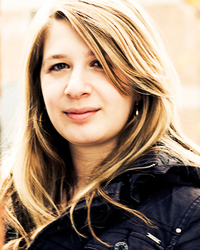
 Word on the Street: Blogging on African American English
Word on the Street: Blogging on African American English
By Renee Blake & Cara Shousterman,
New York University
is a blog devoted to discussing topics surrounding African American English, a dialect of English spoken in large part by African Americans in the U.S. [Editor's Note: See this month's Understanding Linguistic Theory for a full description of African American English.] Some people might call it Ebonics, but linguists prefer to use the term African American English or AAE, which places it alongside other dialects of American English like Southern English, Chicano English, or Appalachian English. Although African American English has a rich history in the mouths of musicians, poets, great writers and thinkers, it has long been misunderstood, and as a result has gotten a bad rap. It is not uncommon hear people refer to it as “bad English”, “broken English”, or “slang”. These kinds of references were particularly prevalent in the nineties during the Oakland Ebonics controversy, where the use of AAE took center stage. In 1996, the Oakland, California school board passed a resolution that recognized the legitimacy of “Ebonics” (AAE) as a language. This resolution had implications for how children would be taught, as it would allowed for the acknowledgement and use of AAE in classrooms with predominantly AAE-speaking children. This initiative was wildly misrepresented by the media, who suggested that students were going to be taught how to speak AAE in schools rather than standard English.
The outcome of the Oakland Ebonics controversy was, for the most part, public outcry, as people feared that children who already came from disadvantaged populations would be further disadvantaged in terms of language arts. African American English, which was never fully understood in the first place by many, found itself in the middle of a firestorm of criticism from which it has never really recovered. To linguists, AAE is a legitimate variety of English with its own grammatical system. It is just as sophisticated and expressive as any language or dialect. We also recognize that AAE can be spoken by anyone of any ethnicity, not just African Americans. Further, not all African Americans speak AAE, nor do they speak AAE all of the time. We have been teaching these ideas in linguistics classes for decades, often with positive results. But the question that comes up is: how do we share our ideas and research on AAE with everyone else?
STUDENTS GENERATING AWARENESS
In creating Word., we hoped to bring awareness not just to African American English as language variety, but also to issues pertaining to and affecting African American communities on a personal level. In Spring 2009, students in an African American English class at New York University (NYU) were challenged to develop a final class project that would serve as a mechanism to share knowledge about African American English in a general public kind-of-way. The result was that one student, Nikki Hossak, a graduating senior, began a blog to educate the wider public about African American English. In Spring 2010, another undergraduate class at NYU was asked to take the seed that Nikki planted and grow it into a meaningful educational and informative tool. Word. The Online Journal on African American English officially launched in April 2010, and since then has received over 27,000 views. Our was a video, again created by an NYU student, Marlene Watts. In this video, Marlene expresses the importance of recognizing the legitimacy AAE through dance. She compares the experience of being asked to suppress one’s home language to being asked to suppress her own West Indian roots. For many people in the U.S., African American English is a part of their culture and their heritage, and to lose it is to lose a part of themselves.
Our blog has grown up a bit since its official launch, and we have posted about politics, education, music, arts and sports as they pertain to AAE and the African American community. This digital publication is read by linguists and non-linguists around the country and used by faculty teaching courses on African American English at several universities. One of our over-arching goals is to provide answers to the questions many people have about AAE, such as , , , and Lighter topics include Music Mondays, where we discuss artists and songs that incorporate AAE, like and , as well as topics in sports, like the controversy over who owns the New Orleans’ Saints chant .
GIVING BACK
Our desire to share information about AAE on a large scale is part of a more general goal of giving back to the communities who provide us with the linguistic data for our research. In his 1997 article Unequal partnership: Sociolinguistics and the African American speech community, John Rickford comments that linguists, particularly sociolinguists, have developed and advanced linguistic theory and methodology (and therefore benefited from) their work with African American communities. He argues that this research has been done without giving back to these communities through representation or practical application. In 1982, William Labov coined the term principle of debt incurred. This principles says “an investigator who has obtained linguistic data from members of a speech community has an obligation to use the knowledge based on data for the benefit the community when it has the need of it.” We now have substantive examples of sociolinguists who are advancing the principle of debt incurred by reaching out to the African American communities through educational programs, historical documentation for the community, community outreach, and teacher education. An early display of this kind of commitment was during the 1979 Ann Arbor ‘Black English Trial,’ (Martin Luther King Junior Elementary School Children et al. v. Ann Arbor School District, see the ), when sociolinguists provided testimony that was critical to the judge’s federal district court ruling in favor of African American children in the school district for whom it was found their dialect had not been taken into account in reading instruction.
In 1998, Walt Wolfram offered the principle of linguistic gratuity, which he argued was an extension of the principle of debt incurred. This principle states, “Investigators who have obtained linguistic data from members of a speech community should actively pursue positive ways in which they can return linguistic favors to the community.” Here, one need not identify a ‘community need’ as stated in the principle of debt incurred in order to take action. For more than a decade Wolfram and his students and colleagues have engaged in community-based collaborative work in an effort to highlight local dialects and “accurately reflect the role of dialects in society vis-à-vis popular stereotypes.” With regard to their work (particularly in Ocracoke, North Carolina), the outcomes have included the production of popular books and articles about its communities’ dialects, assistance to preservation societies with collecting and archiving dialect data, and the development of dialect awareness curricula for community schools.
We want to propose a further derivation of the principle of indebtedness and the principle of linguistic gratuity with the principle of linguistic humanity. Under this principle, we believe that:
Those who investigate the language of a community of speakers should extend their knowledge of that language within those communities, as well as outside of the communities, with the utmost humanity.
This principle forgoes both a ‘community need’ and a necessary direct collaboration with a specific community or community members as in the other two principles. Under this revised principle, scholars have great latitude in how they choose to give back. The principle of linguistic humanity is driven by a moral imperative on the part of the linguist in this case, which can be evaluated through a collaborative process. For us, Word. is one way to give back to the African American community at large through its commitment to training students to ‘give more’ (in the words of Rickford). Through blogging, students are given the opportunity to bridge language with issues that are not only salient and interesting to them, but also to the wider public.
DEVELOPING SKILLS
Word. has also grown to serve an unforeseen purpose—it creates authors. Word. allows students to develop the necessary analytical and technical skills to become writers. This digital publication fosters a collaborative learning and writing process that allows for all involved to engage one another. The study of language is a difficult subject for most. Add to that anthropology, sociology, political economy, and education and it can be daunting. Academic blogging through Word. can be used to teach, test, and inspire students in their learning process. Students must learn because their name on a public document depends on it. Everyone necessarily shines in some way. While the group is important in the blogging process, so is the individual. We negotiate learning processes that can be different for each person and develop strategies that allow for ‘talkers,’ ‘listeners,’ ‘poets,’ ‘philosophers,’ ‘writers,’ ‘introverts,’ and the like to have their time to be heard. We hope that his digital publication is pushing the field of linguistics and influencing others in the way that we talk and write about African American English and related issues.
You can check out Word. The Online Journal on African American English at . You can also become a fan on and follow us on .

 eNewsletter
eNewsletter